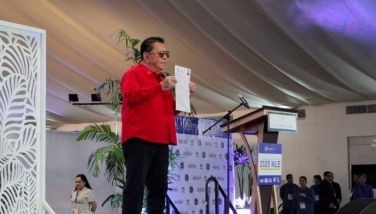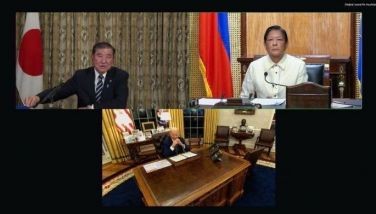Philippines, US demand halt to China reclamation
MANILA, Philippines - The Philippines will join the United States in calling for a stop to China’s reclamation activities in the South China Sea and West Philippine Sea during a gathering in Kuala Lumpur of foreign ministers of the Association of Southeast Asian Nations (ASEAN).
The 48th foreign ministers’ meeting began yesterday with host country Malaysia – through foreign minister Anifah Aman – taking a swipe at Beijing’s refusal to raise the maritime issue before the regional bloc.
Singapore’s foreign minister K. Shanmugam also told reporters in Malaysia the maritime issue cannot be ignored, adding that Singapore is not happy with an informal code of conduct signed by ASEAN and China in 2002.
“As a means of de-escalating tensions in the region, the Philippines fully supports and will pro-actively promote the call of the United States on the ‘three halts’ – a halt in reclamation, halt in construction and a halt in aggressive actions that could further heighten tensions,” Foreign Affairs Secretary Albert del Rosario said in a statement.
Del Rosario said the Philippines would push the US call in the meetings this week, but would not agree to be bound by it unless China and other countries locked in the conflict also do so.
“We have to emphasize, however, that this should not in any way legitimize the status of the features reclaimed by China,” Del Rosario said, referring to massive artificial islands that China started building last year on at least seven disputed reefs.
Rosario said the Philippines would like to see the ASEAN making concrete initiatives to expeditiously conclude a legally binding Code of Conduct (COC).
“The COC should be our priority now if it is still to be relevant, practical and usable in the context of what is happening on the ground,” Del Rosario said.
“The situation of uncertainty in the South China Sea also behooves us to reach a common understanding on the practical meaning of the principles of non-use of force or threat of force and self-restraint in the DOC,” he added.
He said international law and jurisprudence, as well as established best practices, should guide efforts to address challenges on the ground based on such principles of restraint.
“As we speak, we see no letup on the unilateral and aggressive activities of our northern neighbor in the South China Sea,” Del Rosario said, obviously referring to China.
China’s massive reclamation activities now cover at least 800 hectares of areas being disputed or are clearly part of the Philippines. Facilities, many of which are of military nature, have been built on some of the artificial islands.
China’s activities have caused irreversible damage to the region’s marine ecosystem with economic losses estimated at $300 million a year. China’s island building activities have also adversely affected the livelihood of millions of people.
“Our northern neighbor has stated that these facilities will also meet its ‘necessary military defense’ so its statements that it has completed the land reclamations offer no comfort,” Del Rosario said. “In fact, they generate new uncertainties. These activities cannot lawfully change the character, status and maritime entitlements of the affected features under UNCLOS.” UNCLOS stands for the United Nations Convention on the Law of the Sea.
The DFA chief also cited provocative moves by the country’s “northern neighbor,” which have threatened freedom of navigation and overflight as well as raised the risk of miscalculations or full-blown conflict.
“The Philippines has been directly affected by harassment of fishing vessels, destructive fishing activities, unilateral fishing ban and audio challenges against aircraft flying over the South China Sea,” Del Rosario said.
Security issue
Although the maritime issue is not officially on the agenda, developments in the South China Sea and West Philippine Sea are a critical aspect of regional security, and it’s only natural that they be raised in the foreign ministers meeting of the ASEAN, US State Department spokesman Mark Toner said earlier.
“It’s not just the US raising this; there are other members who we expect will raise these issues,” he said.
The US and China are not members of ASEAN but have been invited to participate and Toner said it was highly possible Secretary of State John Kerry would meet with his Chinese counterpart in Kuala Lumpur.
“On the competing claims to sovereignty over the land features in the South China Sea, it’s our strong opinion that a claimant not undertake actions that significantly increase the physical size or functionality of disputed features, or militarize them. We would view that as provocative,” Toner said.
Asked if he was aware the Chinese did not want the sea issue to come up at the ASEAN meeting, Toner said this was a forum in which critical security issues need to be brought up and discussed, and developments in the South China Sea meet that criterion.
“Frankly, that’s why fora such as the ASEAN meeting exists in order to get out – or rather discuss – these issues frankly among nations,” he said.
“We want to see tensions reduced, and in that regard I think we would be interested in hearing other possible ways and means to reduce tensions in the region,” he said.
‘Amicable solution’
The position raised by Malaysia’s foreign minister reflected an earlier one made by the US and the Philippines rejecting China’s warning against any mention of the thorny territorial rifts in the meetings of foreign ministers from the ASEAN and their Asian and Western counterparts.
“ASEAN can and should play a vital part in effecting an amicable settlement” on the South China Sea, Anifah told fellow foreign ministers in his opening address.
“Above all, we must be seen to address this issue peacefully and cooperatively. We have made a positive start but we need to do more,” he said.
“South China Sea is an issue. We cannot pretend that it’s not an issue,” Singapore’s Shanmugam told reporters.
“We have got to move beyond philosophical discussions to actually say what is in the substance of the agreement,” the Singapore official said. – AP, AFP, Reuters
- Latest
- Trending





























